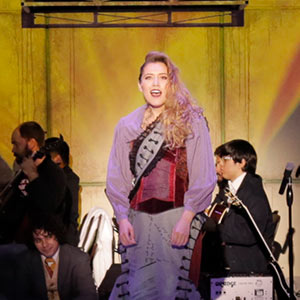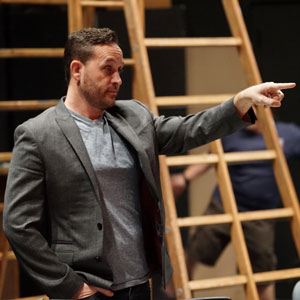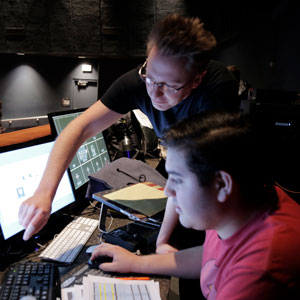'Romeo and Juliet' Gets Lost in Translation
— Fullerton College Hornet - Steve Womack - Saturday, October 18th, 2008
Fullerton College's Theatre Department opened their fall season with William Shakespeare's
"Romeo and Juliet" last weekend.
This iteration of one of Shakespeare's most popular works, directed by Charles Ketter, was adapted to take place in present day Afghanistan. The story of forbidden love is played between a young, Afghani woman and a U.S. diplomat's son.
The massive contextual shift certainly does peak the interest of those who may feel this particular play is a bit over done. A sound concept to be certain.
The problem is that the change is so massive that it took its toll on the production itself.
Despite the well crafted and versatile set design, effective costuming and a cast with a number of profound moments, the production never truly takes flight while viewers try to piece together the concept.
For those who are not familiar with "Romeo and Juliet, Shakespeare tells the story of two young lovers who are forbidden to be together due to their involvement on opposite ends of a bitter feud between two families.
The romance ends in tragedy when, through several terrible twists of fate, the young couple are both found dead, bringing the two rival families together in their grief.
This particular adaption of the Bard's romance tragedy was set in present day Kabul. The set pieces to convey this were simple, yet effective.
All of the scenes were done under the backdrop of a middle eastern town square, with two larger buildings across from each other. One of these buildings served as the House of Capulet, including the infamous balcony where the young lovers eventually profess their love for the first time.
The seemingly ancient buildings, offset by blast marks and the charred remains of what appeared to be a car bomb, convey a community racked by war and strife.
In the plays final scenes the front of the stage gave rise to an eerie graveyard where Romeo and Juliet met their tragic end.
The graveyard was made up of cast iron gating connected to crumbled concrete walls with iron spires and the remains of Juliet's ancestors adding to the feel of emotional purgatory felt by the couple.
Unfortunately, the production itself was not as strong as its technical aspects. There were several issues that arose from the stark change of context, the most glaring of which was the Afghani's delivering their lines with a Middle Eastern accent.
Many actors made it difficult to distinguish what was being said in large chunks of the Capulet scenes.
Whether this was due to the actor not having enough time to fully grasp the weight of mastering a foreign accent or wailing far too much in a dramatic scene, Shakespeare is hard enough to follow without struggling to decipher inaccurate intonation.
"Romeo and Juliet," has quite a few duels within its two acts, the show is about two families at war after all, so strong fight choreography is a must for the performance to be taken seriously.
In this case unfortunately, it fell a bit short. The fights came off a bit repetitive, resorting to the same set of moves in repetition.
Even more confusing was the use of knives in the fights. It is extremely difficult to believe that U.S. Marines, in combat with Afghani malcontents would engage in a knife brawl and only draw a pistol once. It is possible for the use of guns to be incorporated properly, it has been done before.
The cast did as well as they could have under the circumstances. They seemed, at times, overwhelmed, which was a natural reaction, considering what was being asked of them.
Several of the moments where the American soldiers would interact with Romeo fell flat, due in large part to the constant Three Stooges-esque slap fighting they undertook in every exchange.
There were some definite strong moments, namely one between Juliet (Carla Melinna) and her father (John Montano) where she refused to marry the man her father willed and as a result was savagely beaten by him.
The chemistry between the titular characters Romeo (Ryan Knight) and Juliet (Carla Melinna) left a little to be desired at times, but they mostly came together in the warm fuzzy way they were called to convey their characters in.
"Romeo and Juliet" set in Afghanistan was a sound concept that did have a lot of potential.
However, one cannot help but feel that Ketter and company did not have enough time to fully tap into the idea.
They did not necessarily deliver a bad product, not even a below average one, but certainly a product that left some things to be desired, especially with a well known play.








